| | | | | | | | | | | Axios World | | By Dave Lawler ·Jan 06, 2022 | | Welcome back to Axios World. - We're starting tonight's edition (2,021 words, 7½ minutes) in Kazakhstan, where Russian troops have arrived to help put down a very unexpected uprising.
New arrival? Subscribe | | | | | | 1 big thing: Russia sends troops into Kazakhstan's chaos | 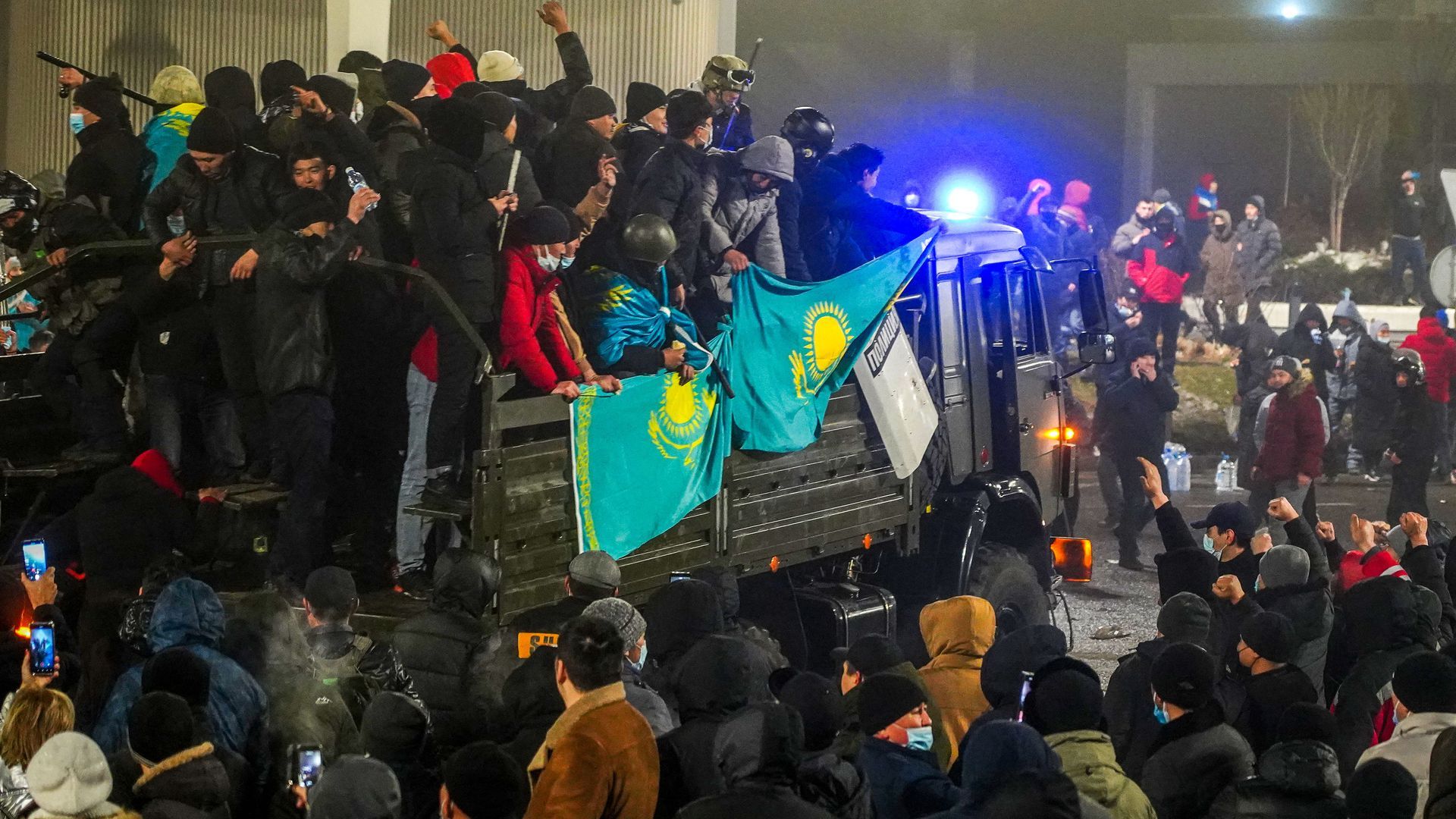 | | | Protests in Almaty on Wednesday. Photo: Abduaziz Madyarov/AFP via Getty | | | | Russian paratroopers arrived in Kazakhstan today as part of a regional peacekeeping mission requested by President Kassym-Jomart Tokayev, who is attempting to forcibly suppress an unexpected uprising. Why it matters: Kazakhstan, a major oil producer that shares long borders with both Russia and China, had been remarkably stable for decades. But within just a few days, a small-scale protest in a remote region evolved into an apparent national revolt, with protesters storming government buildings and briefly seizing an international airport. Driving the news: The protests began over the weekend in western Kazakhstan after the government lifted a cap on fuel prices. They swiftly spread to Almaty, Kazakhstan's largest city, and around the country. - Gunfire continued to ring out overnight, the BBC's Abdujalil Abdurasulov reported from Almaty. A phone and internet blackout has made it virtually impossible to track events nationally.
- According to the government, "dozens" of protesters have been killed and more than 2,000 arrested, while at least 18 security forces have been killed and 748 wounded. Criminal gangs reportedly took advantage of the chaos, which included widespread vandalism and looting in Almaty.
- Having denounced the protesters as "a band of international terrorists," Tokayev now seems intent on suppressing the uprising by force.
The big picture: Kazakhstan is effectively a one-party state that has been dominated since independence from the Soviet Union by Nursultan Nazarbayev and his family and close associates. - Nazarbayev handed power to Tokayev in 2019 in a stage-managed transition that left the ex-dictator as "Leader of the Nation" and chairman of the Security Council — and saw the capital renamed in his honor.
- Hopes that the transition would provide a political opening, raise living standards, or reform the kleptocratic system that's left a tiny elite with a huge share of the national wealth have been unfulfilled, says Bruce Pannier, Central Asia correspondent for Radio Free Europe.
- Protests that began in 2019 would likely have continued if not for the pandemic, which provided the government with a pretext to ban public gatherings, Pannier notes. That helps explain why a small spark led to the current inferno.
On Wednesday, Tokayev removed Nazarbayev from the Security Council, possibly to appease the protesters chanting "old man, go away." The latest: Stanislav Zas, secretary-general of the Russia-led Collective Security Treaty Organization (CSTO), said this evening that the mission would include an initial 2,500 soldiers from Armenia, Belarus, Kyrgyzstan, Russia and Tajikistan and could last "several days to several weeks." - The CSTO says the soldiers will protect "important state and military facilities," rather than cracking down on protesters.
- This is the alliance's first-ever joint mission, and many observers were shocked that the request was made and then so swiftly accepted.
 Map: Kavya Beheraj/Axios China, for which neighboring Kazakhstan is an important source of oil and key transport corridor for the Belt and Road Initiative, has been relatively quiet, though state media has noted Tokayev's claim that the protesters had foreign backing. - The U.S., which also has relatively friendly relations with Kazakhstan, is also calling for calm without publicly pressuring the government. Secretary of State Tony Blinken issued a neutral statement after speaking today with his Kazakhstani counterpart.
- For Vladimir Putin, ensuring a loyal government in a neighboring country that is a key military and economic partner and home to 3.5 million ethnic Russians is of vital importance, says Dmitri Trenin, director of the Carnegie Moscow Center.
|     | | | | | | 2. Kazakhstan crisis complicates Putin's Ukraine calculus | 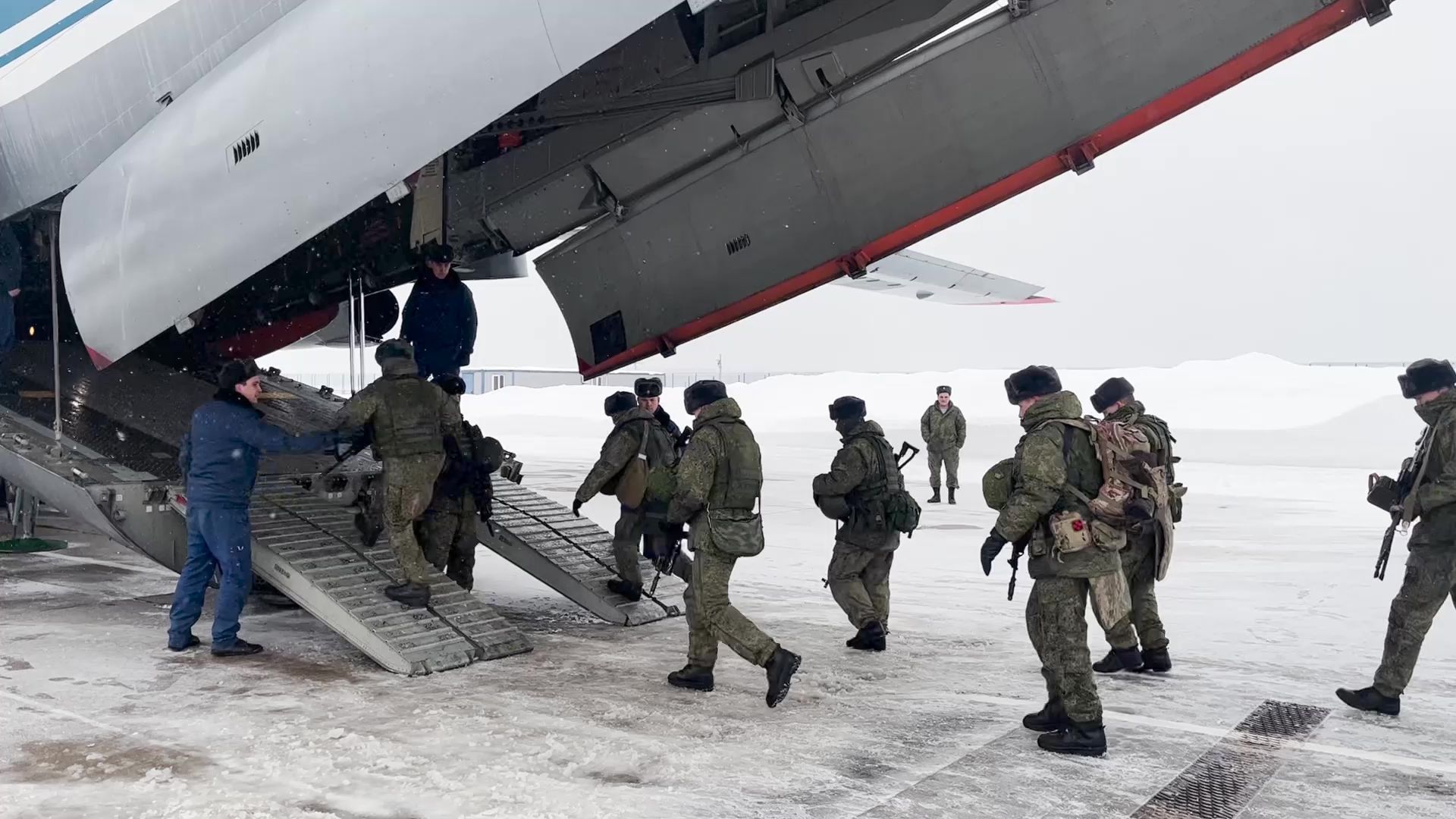 | | | Russian troops boarding a military aircraft in Moscow on their way to Kazakhstan. Photo: Russian Defense Ministry Press Office/Handout/Anadolu Agency via Getty Images | | | | The unrest in Kazakhstan complicates Putin's strategic focus for early 2022, when Russia's military threats against Ukraine were expected to reach an inflection point, Axios' Zach Basu writes. - High-level security talks between U.S. and Russian officials are set to begin Jan. 10 in Geneva, followed by a meeting of the NATO-Russia Council on Jan. 12 and the Organization for Security and Cooperation in Europe on Jan. 13.
- Putin's aims are either to extract concessions on NATO expansion or potentially to invade Ukraine and reverse its Western drift by force.
Between the lines: Experts say Russia's limited deployment of troops to Kazakhstan is unlikely to affect military planning on the Ukraine border, where Moscow is expected to maintain a strong force posture throughout next week's negotiations. - It's a strategic "bandwidth" issue, rather than a logistical one, says Max Bergmann, a European security expert at the Center for American Progress.
- An enduring political and security crisis in Kazakhstan — Russia's top military ally, the largest economy in Central Asia, and a strategic "buffer" state in the region — would require significant Kremlin attention.
- In that context, a large-scale invasion of Ukraine — which would be all-consuming and trigger a massive economic response from the West — could be too much for Putin to take on.
What they're saying: "For Russia, this is an exceptionally delicate mission — Russia has essentially intervened in a domestic crisis in a major neighboring country where people do not welcome foreign interference and where Russia's own population, by a margin of 2 to 1, does not see a need to intervene militarily," says Trenin. Yes, but: The CSTO intervention in Kazakhstan may also present an opportunity for Putin to project strength and restore Russian influence over a neighbor that also has ties to China. - As in Belarus, where embattled dictator Aleksandr Lukashenko has become entirely reliant on Putin, Putin could "turn a crisis into an opportunity," Trenin says.
The bottom line: All that said, instability on his doorstep is the last thing Putin needs ahead of next week's negotiations. Go deeper: No progress with "gun pointed at Ukraine's head," Blinken warns |     | | | | | | 3. As China bullies Lithuania, Taiwan promises help | 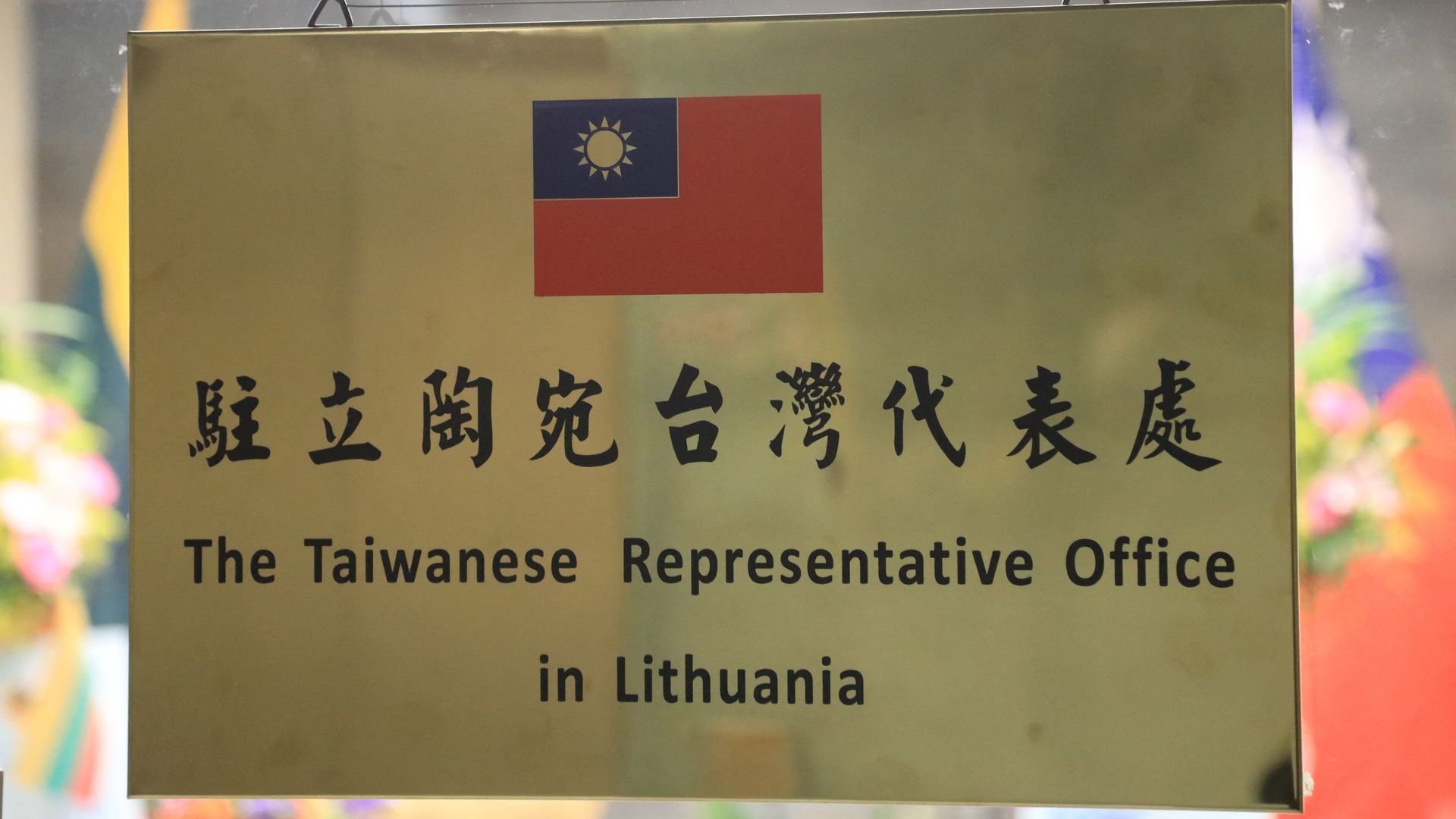 | | | The plaque that caused the fight. Photo: Petras Malukas/AFP via Getty | | | | Taiwan's government announced yesterday it will create a $200 million fund to invest in Lithuania's economy, boost bilateral trade, and send an expert team to help the tiny Baltic nation stand up its own semiconductor industry, Zach writes. Why it matters: Beijing has launched a bullying campaign against Lithuania in response to its decision to allow Taiwan to open an unofficial embassy using its own name, rather than "Chinese Taipei." - Viewing the move as a violation of the "One China" policy, Beijing has recalled its ambassador to Lithuania, downgraded diplomatic relations with Vilnius, and barred all imports of Lithuanian goods.
- Reports have now emerged that Beijing is pressuring European companies to stop using Lithuanian products in their supply chains — an unprecedented intervention that may violate international trade rules.
- The Taiwanese government also purchased 20,000 bottles of Lithuanian rum that had been destined for China before the boycott, and shared suggestions for rum cocktails with the public.
The big picture: Taiwan is stepping up for Lithuania where the European Union — so far — has been either unwilling or unable. - Noah Barkin reports in his Watching China in Europe newsletter that several member states are "deeply unhappy" with how Lithuania handled the Taiwan issue.
- Even Lithuania's own president expressed frustration this week with the naming of the Taiwanese office, claiming that his government did not consult him and that it was a "mistake."
Between the lines: Barkin reports that there's speculation in Germany that the U.S. pushed Lithuania to approve the use of the name Taiwan — though these rumors are undoubtedly colored by Berlin's fears of being pulled into a U.S.-China cold war. |     | | | | | | A message from Axios | | The podcast to power your day. | | |  | | | | Every weekday morning, host Niala Boodhoo catches you up quick on the latest news and interesting stories you won't hear anywhere else. In 10 minutes, you'll hear the latest in US and world news. Listen now for free. | | | | | | Bonus: Where in the world? | | Today we're visiting seven cities that were named for people. I can't fit them all on a map, so I'll give you a clue and tell you when the city got its name, and you name the city. - Big Mediterranean city named for a Great guy (331 B.C.).
- India's fifth-largest city, founded by a sultan (1411).
- Capital city of a superpower (1791).
- African capital named for a U.S. president (1824).
- Southern Hemisphere capital named for a duke who fought Napoleon (1840).
- Big Asian metropolis renamed for a revolutionary (1976).
- Capital city renamed for a guy who is featured in this newsletter (2019).
Scroll to the bottom for the answer. |     | | | | | | 4. Why Macron wants to "piss off" unvaccinated people | 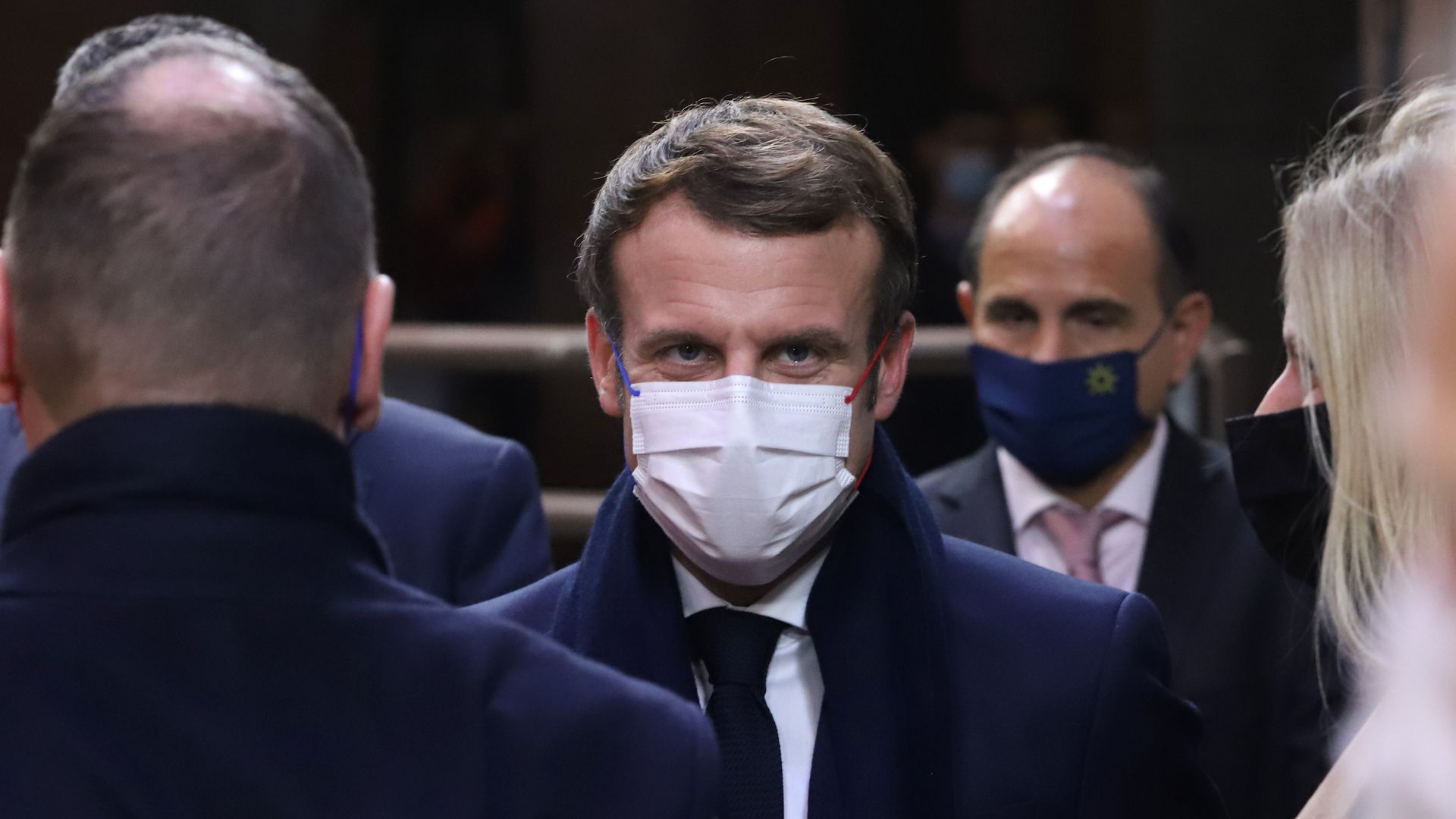 | | | Emmanuel Macron at an EU leaders summit. Photo: Valeria Mongelli/Bloomberg via Getty Images | | | | French President Emmanuel Macron said on Tuesday that he wants to "piss off" unvaccinated people as part of his strategy to fight COVID-19. What he's saying: Speaking to French newspaper Le Parisien, Macron said policies that ban unvaccinated people from cafes and theaters and otherwise limit their social activities are intended to be frustrating. "I really want to piss them off. And so we will continue to do so, to the bitter end. That's the strategy." — Macron Flashback: His announcement of a COVID passport scheme last July was met with angry protests, but also a major uptick in vaccinations as people didn't want to lose access to bars and restaurants. The government now plans to tighten those policies further. What to watch: Italy is trying a different approach, making vaccination mandatory for everyone over 50. - Both countries are experiencing dramatic spikes in cases, with unvaccinated people far more likely to end up in the hospital.
|     | | | | | | 5. Global news roundup | 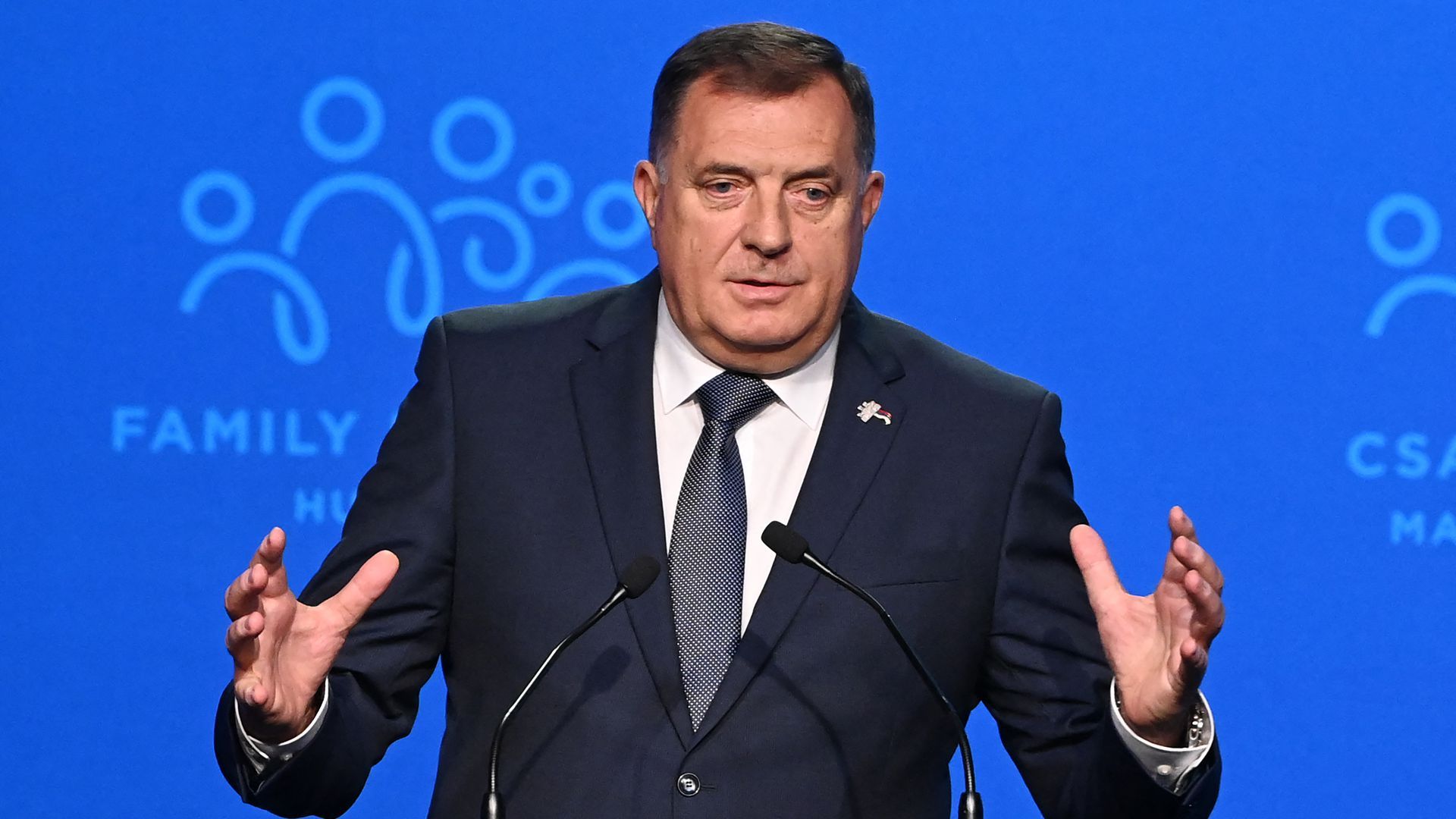 | | | Milorad Dodik. Photo: Attila Kisbenedek/AFP via Getty Images | | | | 1. The U.S. has sanctioned Bosnian Serb leader Milorad Dodik for his "corrupt activities and continued threats to the stability and territorial integrity" of Bosnia and Herzegovina, Zach writes. - Why it matters: The international community's top representative in Bosnia warned in November that Dodik's secessionist maneuvers threatened to break apart the Balkan country and destroy the fragile peace that has held since 1995.
- Dodik, the Serbian member of the country's tripartite presidency, has threatened to withdraw the Republika Srpska from national institutions, including the central tax authority, top judicial institution and — most critically — the armed forces, in order to reconstitute a Bosnian Serb army. Go deeper.
2. Indigenous communities in Oaxaca, Mexico, are replacing corn crops with cannabis in anticipation of marijuana being legalized in the country, Axios Latino co-author Marina E. Franco writes. - Driving the news: A national bill that would decriminalize cannabis for recreational use has been approved by the lower house and a Senate vote is anticipated in the upcoming legislative period. Go deeper.
3. Chinese Foreign Minister Wang Yi sent two interesting signals today while visiting Kenya, per Reuters: - Wang said China wants to focus less on infrastructure investments in Africa and more on trade.
- He also announced that China would appoint a special envoy for the Horn of Africa (the EU, UN and U.S. all already have regional envoys).
Worth noting: U.S. envoy Jeffrey Feltman is stepping down after a tumultuous year on the Ethiopia and Sudan files. He'll be replaced by David Satterfield, who was until recently ambassador to Turkey. |     | | | | | | 6. "The coming carbon tsunami" | 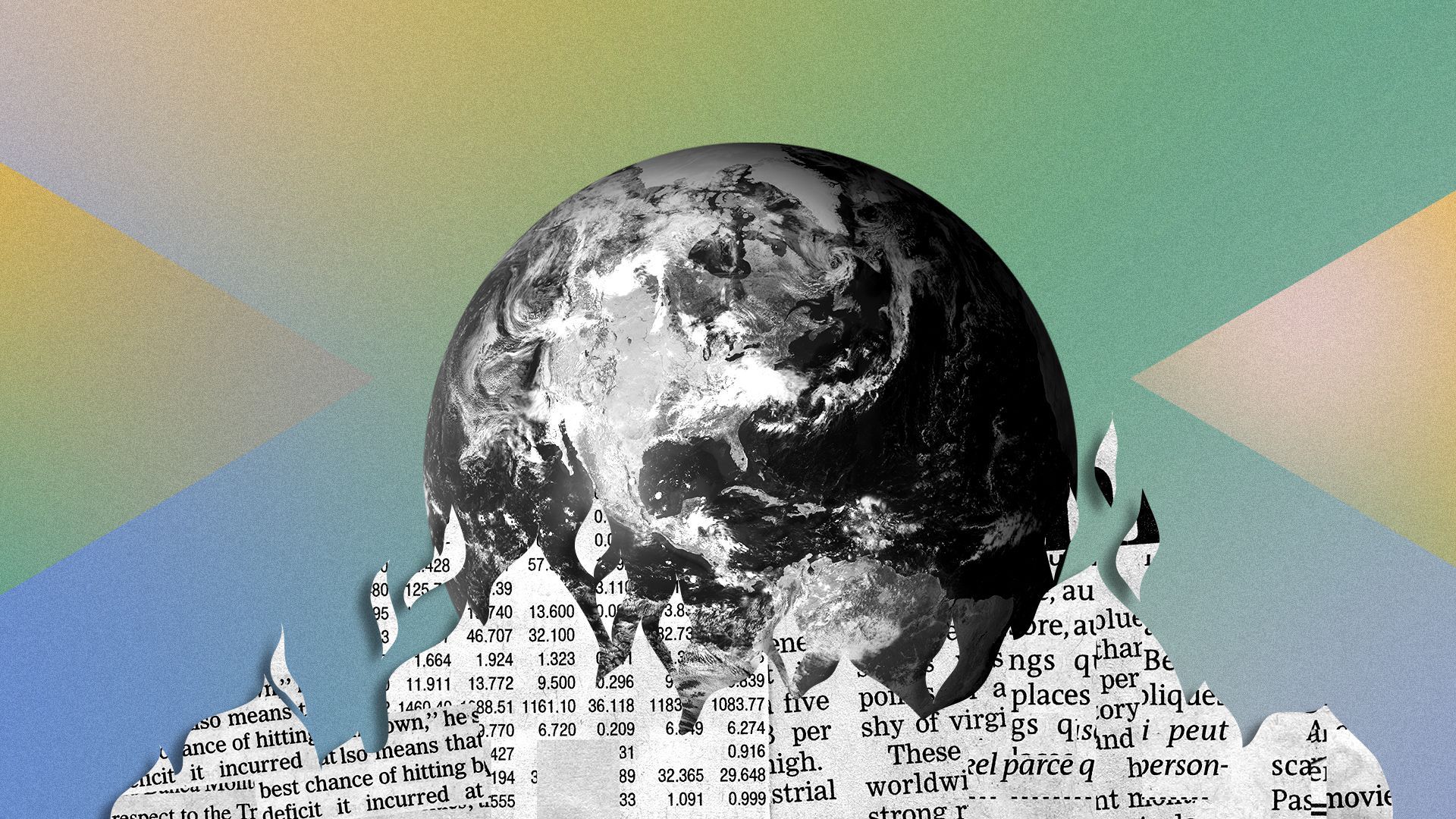 | | | Illustration: Aïda Amer/Axios | | | | My colleague Ben Geman looks at two new essays about the scale of the challenge of keeping global temperature goals within reach: Tufts University's Kelly Sims Gallagher, writing in Foreign Affairs, warns of a "coming carbon tsunami." - Countries like India, Brazil, Indonesia and Nigeria face the immense challenge of tackling poverty while simultaneously trying to address climate change.
- The bottom line: "[I]f developing countries follow the 'grow first and clean up later' pattern established by the United States, western Europe, and East Asian countries, the consequences for the climate will be catastrophic."
Meanwhile, in Columbia University's Journal of International Affairs, Daniel Propp writes that with two months of hindsight, the outcome of COP26 "appears decidedly mixed." - "Glasgow's true impact will be decided in board rooms and legislative chambers from Beijing to Brasilia to Washington, DC," he writes.
- Propp argues that there may never be a "turning point" in the fight against climate change, just "a long series of efforts to deal with a problem that is not going away any time soon."
|     | | | | | | 7. Stories we're watching | 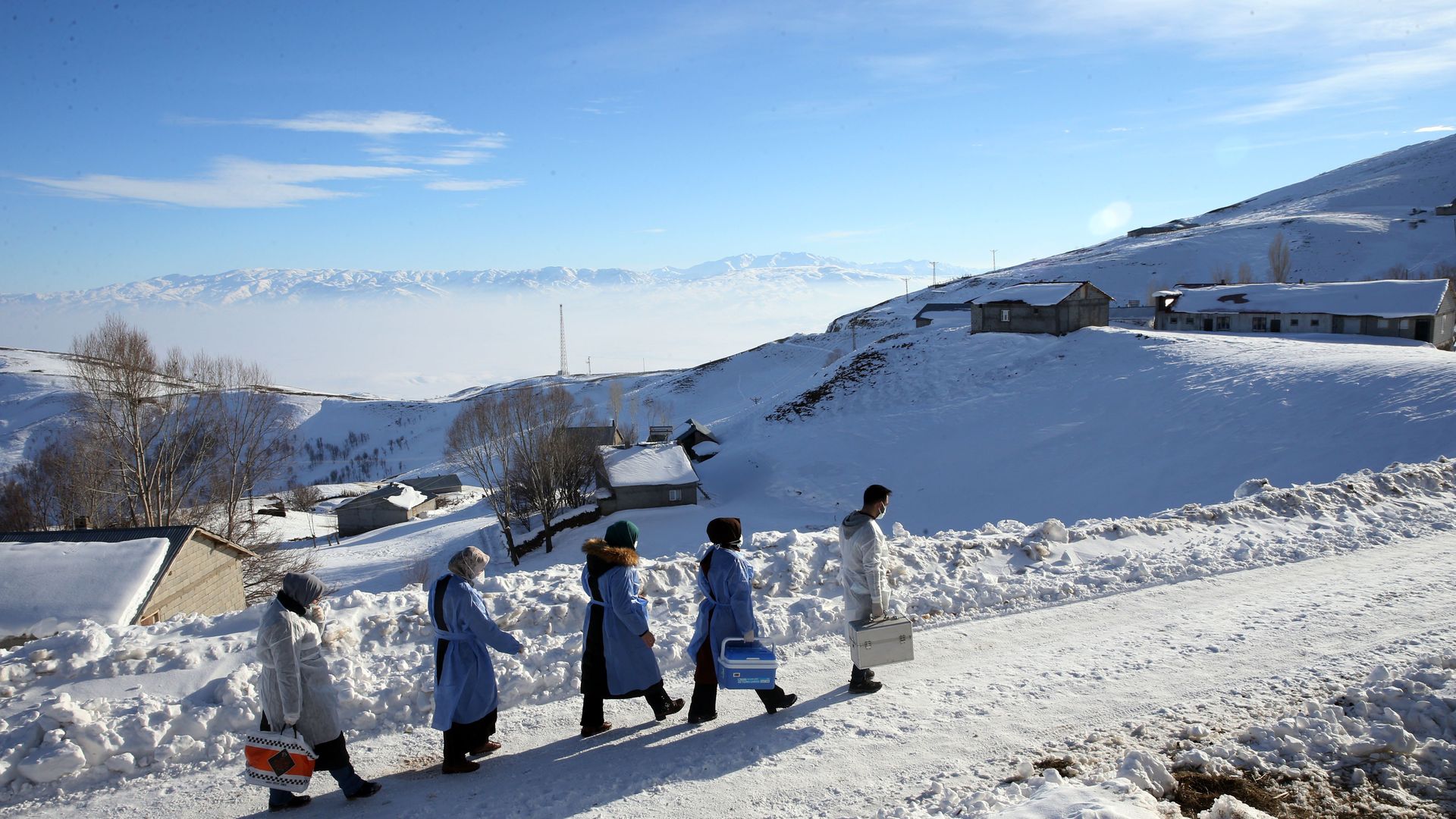 | | | A mobile vaccination team in Mus, Turkey. Photo: Ibrahim Yaldiz/Anadolu Agency via Getty | | | - North Korea launches ballistic missile
- Israel's military intel chief says Iran deal better than no deal
- Sudan PM's resignation leaves military in a bind
- 1.8 million excess deaths due to air pollution
- Canada reaches deal to compensate mistreated Indigenous children
- U.S. now world's top LNG exporter
- Japan asks U.S. troops to stay on base to stop COVID spread
Quoted: "No one except the quislings and enablers can kid themselves — press freedom is dead in Hong Kong." — Mark Clifford, president of the Committee for Freedom in Hong Kong and former editor-in-chief of the South China Morning Post. Go deeper. |     | | | | | | A message from Axios | | The podcast to power your day. | | |  | | | | Every weekday morning, host Niala Boodhoo catches you up quick on the latest news and interesting stories you won't hear anywhere else. In 10 minutes, you'll hear the latest in US and world news. Listen now for free. | | | | Answers: 1. Alexandria, Egypt. 2. Ahmedabad, India. 3. Washington, U.S. 4. Monrovia, Liberia. 5. Wellington, New Zealand. 6. Ho Chi Minh City, Vietnam. 7. Nur-Sultan, Kazakhstan. |  | Bring the strength of Smart Brevity® to your team — more effective communications, powered by Axios HQ. | | | | | | Axios thanks our partners for supporting our newsletters. If you're interested in advertising, learn more here.
Sponsorship has no influence on editorial content. Axios, 3100 Clarendon Blvd, Suite 1300, Arlington VA 22201 | | | You received this email because you signed up for newsletters from Axios.
Change your preferences or unsubscribe here. | | | Was this email forwarded to you?
Sign up now to get Axios in your inbox. | | | | Follow Axios on social media:    | | | | | |













No comments:
Post a Comment